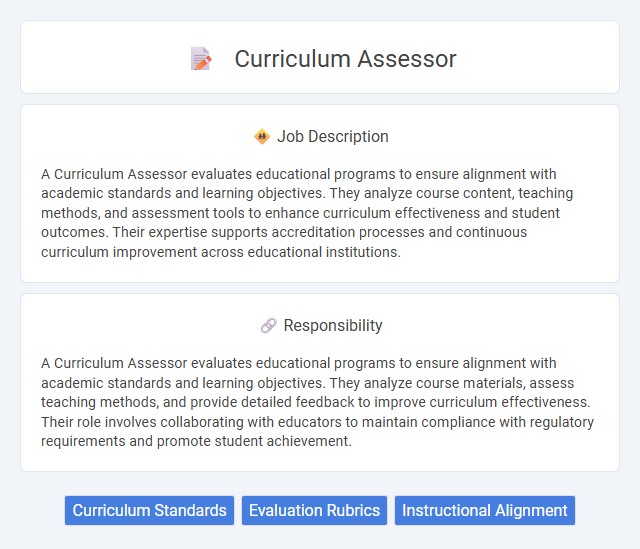
A Curriculum Assessor evaluates educational programs to ensure alignment with academic standards and learning objectives. They analyze course content, teaching methods, and assessment tools to enhance curriculum effectiveness and student outcomes. Their expertise supports accreditation processes and continuous curriculum improvement across educational institutions.
Individuals with strong analytical skills and a passion for education are likely to be well-suited for a Curriculum Assessor role, as the position demands detailed evaluation of educational content and alignment with standards. Those who prefer independent, structured work environments and have the ability to critically assess curriculum effectiveness may find this job rewarding. Conversely, candidates lacking attention to detail or struggling with objective analysis might face challenges adapting to the responsibilities of this role.
Qualification
A Curriculum Assessor typically requires a bachelor's degree in education, curriculum development, or a related field, with many employers preferring candidates holding a master's degree. Professional certifications in instructional design, assessment strategies, or educational measurement enhance qualifications and demonstrate specialized expertise. Strong analytical skills and experience in evaluating educational programs or materials are essential for effectively assessing curriculum quality and alignment with learning standards.
Responsibility
A Curriculum Assessor evaluates educational programs to ensure alignment with academic standards and learning objectives. They analyze course materials, assess teaching methods, and provide detailed feedback to improve curriculum effectiveness. Their role involves collaborating with educators to maintain compliance with regulatory requirements and promote student achievement.
Benefit
A Curriculum Assessor likely enhances educational quality by identifying gaps and ensuring alignment with standards, which can improve student outcomes. This role probably supports educators in refining their teaching methods through detailed feedback and data analysis. Organizations may benefit from increased accountability and more effective curriculum implementation, leading to better overall performance.
Challenge
The Curriculum Assessor role likely presents challenges in balancing comprehensive content evaluation with diverse educational standards and learning outcomes. There is a strong probability that staying updated with evolving pedagogical theories and regulatory requirements demands continuous professional development. Managing time efficiently while ensuring accuracy and relevance of assessments could also pose significant challenges in this position.
Career Advancement
Curriculum Assessors play a crucial role in evaluating educational programs to ensure alignment with academic standards and learning objectives, making their expertise highly valued in the education sector. Advancing in this career often leads to senior roles such as Curriculum Developer, Education Consultant, or Instructional Coordinator, where strategic decision-making and policy development are key responsibilities. Continuous professional development and specialized certifications in educational assessment or curriculum design significantly enhance promotion prospects and leadership opportunities.
Key Terms
Curriculum Standards
Curriculum Assessors specialize in evaluating and ensuring alignment between educational programs and established curriculum standards, focusing on academic rigor and compliance with regulatory frameworks. Their expertise includes analyzing curriculum frameworks, assessing instructional materials, and verifying that learning outcomes meet national or regional benchmarks. Effective assessment supports continuous improvement in educational quality and fosters student achievement by maintaining consistency with standardized curriculum requirements.
Evaluation Rubrics
A Curriculum Assessor specializes in developing and applying evaluation rubrics to measure the effectiveness of educational programs and instructional materials. These rubrics provide detailed criteria and performance levels that ensure consistent and objective assessment of learning outcomes. Proficiency in designing clear, measurable descriptors within rubrics enhances the alignment of curriculum goals with assessment standards, leading to improved educational quality and accountability.
Instructional Alignment
A Curriculum Assessor specializing in Instructional Alignment evaluates educational programs to ensure course content, teaching methods, and assessment practices are coherently aligned with learning objectives and standards. They analyze curricular materials and instructional strategies to identify gaps or inconsistencies that may hinder student achievement and recommend adjustments to enhance instructional efficacy. Expertise in instructional design principles and curriculum frameworks enables them to optimize educational outcomes through systematic alignment processes.
 kuljobs.com
kuljobs.com